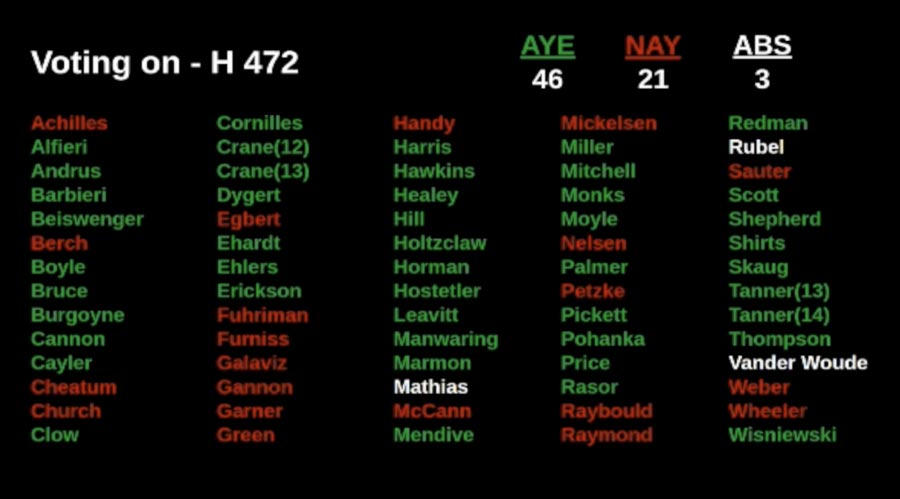
Kyle Pfannenstiel, Idaho Capital Sun
 Idaho House of Representatives January 2025 | Pat Sutpin, EastIdahoNews.com
Idaho House of Representatives January 2025 | Pat Sutpin, EastIdahoNews.com
BOISE (Idaho Capital Sun) — After a long debate Wednesday, the Idaho House passed — on a nearly veto-proof majority — a bill that would ban business, governments and schools from requiring medical interventions.
House Bill 472 is the House’s revised version of a so-called medical freedom bill that Gov. Brad Little recently vetoed.
The House’s 40-minute debate Wednesday turned contentious and oftentimes definitional. Bill cosponsor Rep. Robert Beiswenger, R-Horseshoe Bend, once refused to answer a question from another lawmaker.
Opening the House’s debate, Beiswenger said the bill “prevents medical force, medical mandates. People can choose them if they want to, but they don’t have to if they don’t want to. You can ask people to leave your place of business. But you can’t force them into medical treatments like vaccines or other kinds of treatments.”
A quarter of the Idaho House’s 70 lawmakers rose to debate the bill, which was evenly split in support and opposition. But the House ultimately passed the bill on a 46-21 vote, with one fewer vote in support than the House’s vote on the original bill, Senate Bill 1023, two weeks ago. (Three House members were absent for Wednesday’s vote. None were absent for the original bill vote.)
Critics’ central concern on the bill was that it would prevent workplaces from refusing service — or entrance of their facilities — to sick people.
RELATED | After Gov. Little vetoes Idaho ‘medical freedom’ bill, Legislature pursues tweaks
Pressed on if the bill prevents businesses from forcing people to leave, sponsor suggested he believes it wouldn’t
Asked three times if the bill would prevent that by Rep. Dan Garner, R-Clifton, Beiswenger replied by suggesting he believed it would not.
“Can the business ask someone to leave — force someone to leave, if they feel like they are sick?” Garner asked.
“Again, the bill doesn’t address it directly. But I believe a business would be within their rights to ask someone to leave if they are sick,” Beiswenger replied.
Garner didn’t seem convinced.
“This bill, to me, goes a step too far (in) that it imposes someone’s freedom or rights on their private property or private business,” he said.
Debating in favor of the bill, Rep. Kyle Harris, R-Lewiston, argued that debate was straying from the bill’s intent.
Debating against the bill, Rep. Ben Fuhriman, R-Shelley, and Rep. Todd Achilles, D-Boise, referenced the bill’s specific language.
“I don’t care what your intentions are. A law is a law,” Fuhriman said. “And it’s written right here on page two, line 29: A business entity doing business in the state of Idaho shall not refuse to provide any service, product, admission to a venue, or transportation to a person — because that person has or has not received or used a medical intervention.”
 Courtesy of Idaho in Session
Courtesy of Idaho in Session RELATED | Gov. Little boasts ‘medical freedom’ in Idaho, vetoes bill to ban vaccine mandates
Medical mandates include diagnosis or treatment. Ban extends to entry or service refusal.
Like the original bill that Little vetoed, two new bills introduced this week in the House and Senate would pursue similarly broad medical mandate bans.
The bills would ban businesses and any Idaho governments — local, county or state — from requiring medical interventions for employment, admission to venues, transportation, or providing products or services.
The bill would’ve also extended to schools in Idaho — private or public — and colleges, universities and trade schools, blocking them from requiring medical interventions for school attendance, employment, or entrance into campus or school buildings.
Under the bills, medical interventions include “a procedure, treatment, device, drug injection, medication, or action taken to diagnose, prevent, or cure a disease or alter the health or biological function of a person.” (The House tweaked the bill Wednesday to add a comma between “drug” and “injection.”)
New bills tweak originals to address governor’s school concerns. But it’s unclear which will succeed.
The House’s revised bill, House Bill 472, adds language specifying that the bill wouldn’t overrule existing powers of school districts, or school board trustees — as already granted in Idaho law. After passing the House on Wednesday, the bill is headed to the Senate for consideration
The Senate’s revised bill, Senate Bill 1210, exempts day cares and adds language specifying the school medical mandate ban provision is subject to various other Idaho laws that let school boards block sick students from attending, spell out parental rights, and more.
The Senate amended its version on Wednesday by tweaking the new language related to schools.
It’s not immediately clear when the Senate will vote on the amended bill, or consider the House’s version.
To become law, Idaho bills must pass the House and Senate, and avoid the governor’s veto.


















 English (United States) ·
English (United States) ·